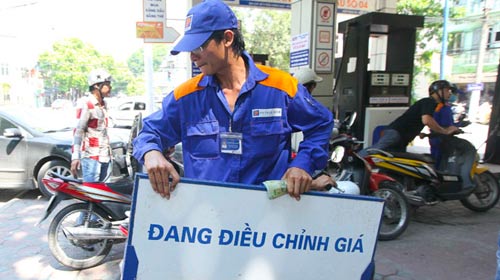If Viet Nam could control inflation cautiously and proactively, the CPI for the whole of 2021 would rise by below 3 per cent, said an expert in Ha Noi last week.

If Viet Nam could control inflation cautiously and proactively, the CPI for the whole of 2021 would rise by below 3 per cent, said an expert in Ha Noi last week.
Le Quoc Phuong, former deputy director of the centre for Industry and Trade Information from the Ministry of Industry and Trade, told a conference on prices in the first half of the year that the country maintained low inflation in 2021.
According to the conference held by the Institute of Economic and Financial Economics and the Price Management Department from the Ministry of Finance, the price level in H1 was normal, inching higher during the Tet (Lunar New Year) festivals and falling back at other times.
A representative of the General Statistics Office (GSO) said compared to the last month of 2020, January's CPI increased by 0.06 per cent and February’s by 1.52 per cent. The CPI decreased by 0.27 per cent in March, by 0.04 per cent in April, increased by 0.16 per cent in May, and was up 0.19 per cent in June.
After the first half of the year, the CPI increased by 1.47 per cent over the same period in 2020, the lowest increase since 2016.
Nguyen Ba Minh, director of the Institute of Financial Economics, said the CPI increased in H1 due to increases in petrol and oil prices, the price of educational services, the price of rice and of construction materials.
Factors pushing down CPI growth included food prices, the deployment of Government support packages, as well as less travel due to the impact of the pandemic.
Nguyen Duc Do, deputy director of the Institute of Economics and Finance, said due to the decline in domestic demand, the core inflation in June increased by 0.07 per cent from May and by 1.14 per cent from April. Lower core inflation along with the decline of food prices such as pork and chicken had balanced out the impacts of gasoline prices and rising prices of construction materials, said Do.
Regarding H1’s low inflation, economist Ngo Tri Long said: “It is a favourable condition to create room to control inflation for the whole year to reach the target.”
Long added: “However, Viet Nam should not lose focus as inflation pressure will continue to increase from now until the end of the year. The prices of raw materials and materials for production increased sharply by 4.79 per cent in the first half, which is the highest level since 2013."
Nguyen Ba Minh predicted average CPI in 2021 would be at 2.5 per cent, 0.3 percentage points higher than 2020, forecasting the prices of some essential goods will cool down, market prices will be stable and there will be no fluctuations.
The department forecast the inflation risk in 2021 was not high, so the average annual inflation of less than 4 per cent was to be met.
Nguyen Duc Do said that weak aggregate demand due to COVID-19 was the basic reason for low inflation in Viet Nam in the context of high prices of basic commodities globally, adding: “The target of controlling average inflation to below 4 per cent in 2021 will certainly be achieved. However, low inflation due to weak aggregate demand is not necessarily a good thing."
Do calculated if the price growth was maintained for the rest of the year at about 0.27 per cent each month, the inflation over the same period last year would increase from the current 2.41 per cent to 3.2 per cent in December and the average inflation for the whole year would be at 2.12 per cent.
If the gasoline prices continued to rise sharply and CPI was assumed to increase by an average of 0.5 per cent per month, inflation by December 2021 would be at 4.71 per cent and the average inflation 2.53 per cent.
At the conference, Dinh Trong Thinh, from the Academy of Finance, proposed two scenarios for CPI in 2021. If the pandemic continues and the world economy recovers slowly, Viet Nam's economy would increase at 6.8 to 7 per cent, the inflation rate for the whole year would be around 3.3 to 3.5 per cent; and if the economy grew at between 7 and 7.4 per cent, the inflation rate would be at 3.8 to 4 per cent.
Le Quoc Phuong, said to keep the CPI of the whole year below 3 per cent, it was necessary to closely monitor the price movements of essential commodities and not increase the prices of items in the current context.
Phuong added: “We need to manage the prices of a number of commodities well, such as iron and steel, gasoline, aviation services, medical services, land, and real estate. It is necessary to prepare a reserve of goods to meet consumer demand, to avoid scarcity that pushes prices up sharply.”
The experts at the conference said the Government should focus on operating monetary, interest rate and exchange rate policies in a flexible and prudent manner, in line with domestic and international market developments, in coordination with other countries. It was also necessary to harmonise fiscal policy and other macro policies, in order to control inflation, support production and business and promote economic growth.— VNS
- Tags
- CPI growth





